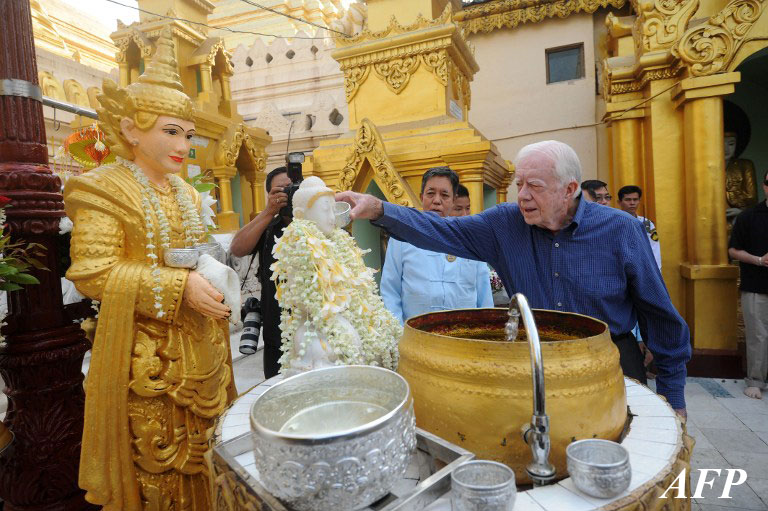Former US President Jimmy Carter on Friday urged Western countries to lift the remaining economic embargoes on Myanmar and said he welcomed the ongoing reforms in the country, calling for human rights and peace to ensure the country's transition to democracy.

"It is important to speak honestly and directly about the serious challenges that still exist. It's a mistake to try and cover up challenges," said the Nobel Peace Prize laureate, speaking at Yangon's Park Royal Hotel to members of the public and the media at the end of his five-day trip to the country with his NGO, The Carter Center.
The 88-year-old was accompanied by his wife of 67 years, Rosalynn, and said that the trip was "one of the most pleasant, challenging and encouraging trips I've ever had," and that he was filled with admiration for Myanmar's political leaders and the ongoing reform process, during "truly a historic period for the country".
Following meetings with politicians, religious leaders, ethnic minorities and former political prisoners, Carter said that he was deeply concerned by the religious violence in central Myanmar and was "saddened" to hear of the ongoing conflicts in Kachin and Shan states. He called for the end of all grievances of the country's ethnic nationalities.
"No people should be treated as inferior by the government or by other citizens," said the former president who called for freedom of movement and for all displaced persons to be allowed return home.
"Peace is a pre-requisite for achieving [Myanmar's] goals," said Carter, who congratulated the leaders of all the ceasefire groups for their efforts to date and called for trust and compromise between all parties.
"Respect for human rights must be a cornerstone of Myanmar's transition to democracy," he said.
Carter met with President Thein Sein on Wednesday and during discussions about the ongoing reform process, reportedly advised him that "mutual respect, tolerance and open-mindedness are the basis for a democratic society".
Together with his NGO, Carter has helped fight poverty, human rights abuse and disease around the world.
He has also observed democratic elections in 94 countries and said that, "if we are invited, we would like to come back in 2015".
Carter served as the 39th US President from 1977-81. He is part of a group of former world leaders called The Elders, founded by Nelson Mandela in 2007, which works together for peace and human rights and has consistently supported Aung San Suu Kyi.
President Carter was introduced by US Ambassador Derek Mitchell who hailed him as "a personal hero" for "dedicating his life to fighting the good fights".


